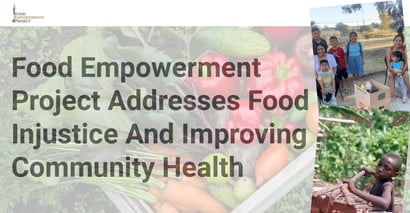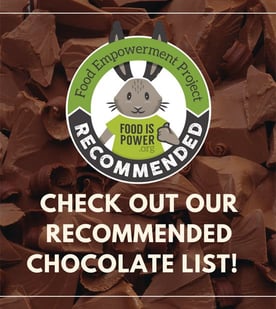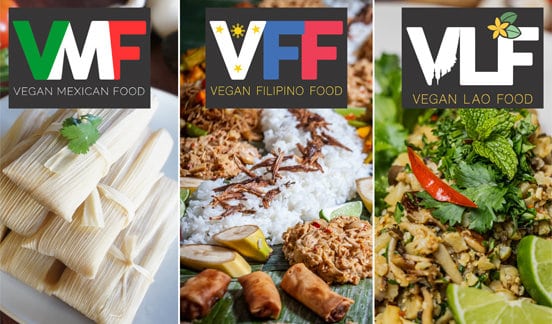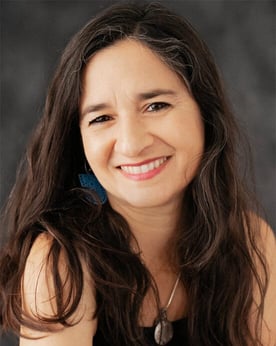
In a Nutshell: The food we eat has an impact at various levels, even if it is vegan, and the Food Empowerment Project (F.E.P.) strives to bring food awareness into the public sphere. The nonprofit organization works with underserved communities to not only address healthier options but also understand the needs of those communities in terms of what is accessible to them. F.E.P. is also working to end farmworker injustice and operates a number of projects, including school drives.
Food impacts the way we live our lives. Our food supply is a massive interconnected system reaching every corner of the world. From fields to factories and farmers to corporations, everything is connected at different levels.
So when choosing what food to eat, we are also choosing what industries to support.
That means people hold responsibility over how the food system operates, but that responsibility can be empowering. By making conscious decisions about what kind of food we eat, we can affect ecosystems and the lives of humans and animals.
The Food Empowerment Project (F.E.P.) has a mission to create a more just and sustainable world by recognizing the power of our food choices. The nonprofit organization also strives to introduce healthy and sustainable food options to people living in underserved communities.

While it is challenging to get healthier food in the hands of people with limited options both economically and geographically, F.E.P. is finding ways to break barriers.
The organization was founded 15 years ago by lauren Ornelas with the mission of not using animals for ethical reasons and protecting human rights. It’s been difficult at times to help people understand that caring for both issues is important.
“In the past, there was a struggle with some in the vegan community to understand that,” said Ornelas.
Ornelas was raised with an understanding of farmworker justice issues, and she wanted to remind vegans of the connection between promoting veganism and what’s happening to farmworkers in the fields.
The Food Empowerment Project is also engaged in fighting food apartheid and the lack of access to healthy foods in black and brown communities, as well as areas where indigenous groups live. Ornelas believes that food can be used as a tool for positive social change. That includes informing people to recognize certain privileges they possess, like being able to eat more than one time a day, and to understand the responsibility that goes with it.
Identifying Food Sources and Farming Injustice
The reason why the word empowerment is in the nonprofit organization’s name is because Ornelas wanted people to feel empowered by their food choices and try to make a positive impact on the world whether it affects human or nonhuman animals.
When people become attached to their food by growing it themselves, they gain more concern and care for everything that entails to nature, the environment, and their own health. People who grow their own food can also gain an appreciation for all the hard work that goes into growing and harvesting food.
If people aren’t growing their own food, then the question of where our food originates from becomes more relevant. Even within the vegan lifestyle, there are products that may come from unethical origins. Ornelas discovered this in the early 2000s when she learned about chocolate and how that industry has ties to modern slavery and child labor.
Over the past few decades, journalists have exposed the shocking and unethical practices being conducted by cocoa farms in Western Africa and Brazil, which happen to supply chocolate to some of the largest production companies.

“I was horrified and felt similarly to what I did about non-human animals,” said Ornelas. She said it was the same feeling she had when she found out about cruelty to animals used for food or entertainment. Ornelas said she decided to change that in her life and raise awareness to others as well.
“When I learned about chocolate, it was that same crystallization,” she said. Ornelas made that issue a part of the Food Empowerment Project to remind vegans that even if a product does not use animals in any way, that doesn’t guarantee it is cruelty free — especially if it is at the hands of enslaved people or child labor.
To combat unethical chocolate production standards, the nonprofit organization created the F.E.P. Chocolate List, which categorizes vegan brands using chocolate based on the treatment of their laborers.
“We call it ‘eating your ethics.’ Making sure that if you care about animals, you’re not consuming animals because that harms them — but also, if you don’t believe in enslaving children or people at all for chocolate, that you don’t support those industries,” said Ornelas.
Introducing Healthy Foods in Underserved Communities
One of F.E.P.’s biggest initiatives is getting more vegan options available to people who live in underserved areas. Part of that effort requires helping people get over the preconceived notions of veganism. And some of the responsibility falls on the vegan movement as well.
Ornelas said we need to have more Black and brown people talking about veganism and addressing it in a way that genuinely resonates among those communities. There also needs to be some understanding that, while it’s not easy for everybody to go vegan, at least these communities can hear some options or talk about getting those healthy foods into the communities.
The nonprofit’s founder said there are major disparities in food availability from one area to another. “I lived and worked in downtown San Jose, California, where I had two liquor stores across the street from each other, and I had to drive 15 miles to another town to get organic produce.”
Ornelas said there’s a big problem accessing healthy food when you have to go all the way to Silicon Valley just to get something nutritious.
“What we saw in these communities was that the vast majority were people in the lower income communities — the black and brown communities — getting their food from convenience stores and liquor stores,” said Ornelas.
“You go into a liquor store in Palo Alto, they’re selling you alcohol. You go to a liquor store in downtown San Jose, and they’re also selling you ramen and some canned foods,” she said.
The nonprofit organization conducted focus groups and discovered that many immigrants actually ate healthier in their home countries than they did after moving to the United States.
“In their home countries, they might grow things like tomatoes. But when they came here, the only thing that was available to them at these liquor stores and convenience stores was tomato sauce,” said Ornelas.

So in terms of the solutions, F.E.P. felt that it is important for these people to grow their own food to be part of a system they can control, and not be bound by anybody else.
Ideas that have come to mind include community-embedded worker-owned cooperatives in which the workers are the ones making the decisions about the profits and see their value in the community. Ornelas hopes that can create more jobs and make more money in those communities.
Ornelas also believes it is important to have vegan foods available to different cultures. The Food Empowerment Project has created vegan food guides on its website and booklets that cater to vegan Mexican, Filipino, and Lao cuisine.
Creating Initiatives For a Better Future
After 15 years of campaigns and tools to help people eat ethically, the Food Empowerment Project is continuing to create a social impact for human and nonhuman animals.

Every year, the nonprofit holds school supply drives for the children of farmworkers and encourages them to get the best education they deserve.
“We don’t see that as a form of charity,” said Ornelas. “We see that as a way of righting an injustice that’s taking place against farm workers. It’s really a way for us to give back and say thank you to their parents for the sacrifices that they make for all of us to eat.”
Going forward, Ornelas said it is imperative to provide tools to help people lead a vegan lifestyle. She recounted that when she tried to be a vegetarian in elementary school, her family didn’t have much money, so Ornelas wasn’t able to stick with it.
“I don’t want to just teach somebody about all the horrible things that are going on in the world. I want them to give them ideas on how they can not participate in it and also make a difference,” said Ornelas. “Individual choices, but also using their collective voices to make a difference.”
A lot of that work is in trying to stop injustice from taking place when people don’t have access to healthy foods. Ornelas said it would be ridiculous to push veganism on underserved communities if they don’t even have access to fresh produce.
“My goal is to get you some healthy food, and then I’ll talk to you about veganism. But let’s get some justice in your community first and foremost,” she said.






